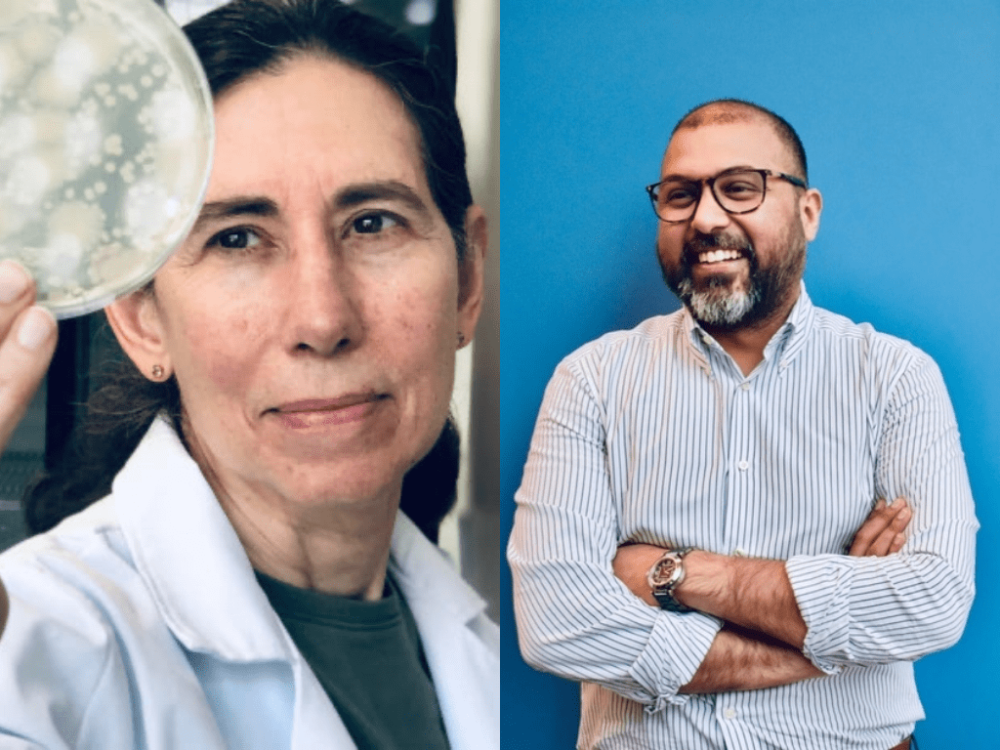An influx of ag biotech startups has emerged in recent years and re-stoked the debate around genetically modified organisms (GMOs) and the ability to engineer crop solutions that promise environmental benefits like reduced food loss, diminished reliance on chemical pesticides, and carbon sequestration.
One such company is the US’s Aanika Biosciences, which uses microbes to create edible ‘tags’ that can track food throughout its entire supply chain journey. Think of the tags as a watermark for food shipments that enable a business to trace, say, a case of lettuce back to its source in the event of a foodborne illness outbreak.
The New York-based startup, which closed a $12 million Series A round last month, is also adding other properties to these microbial tags, such as anti-fungal capabilities that could significantly decrease food loss from spoilage. Aanika’s founder and CEO Vishaal Bhuyan told AFN at the time that enabling traceability and prevention are two major ways we can secure the food system and simultaneously combat climate change.
As GMOs and genetic engineering remain a hotly debated topic, one major challenge for Aanika Biosciences as it scales up will be contending with negative perceptions and educating clients and consumers.
Read on for more from Bhuyan (VB) and Aanika Biosciences’ chief science officer Ellen Jorgensen (EJ) on GMOs, climate change, and why they believe we need more of the former to fight the latter.
AFN: Would you say consumer perceptions around GMOs changed in the last couple years? If so how?
VB: [Perception] is shifting. I think there’s a way to go, but if you look at the Impossible Burger, that’s really our model. Impossible Burgers are very GMO. People embrace it because the ESG narrative is stronger than the 1990s-era ‘Monsanto is the devil’ story and so people are adapting. They’re going to look at GMOs as a tool to protect the environment. I think the new story is that we need them.
There’s a New York Times article [from] a couple months ago about why we need to embrace GMOs. This wasn’t even remotely talked about eight, nine, 10 years ago. Now it’s definitely becoming more accepted.
It touches our regulatory path we’re working [on]. We’re in conversations with the [US Food and Drug Administration]. We’ve got a head of regulatory and scientific affairs person. They understand the safety of what we’re doing and the edits that we’re making.
We we actually think that at some point, if this really takes hold, it will be more like a badge of approval. Maybe it commands a higher premium at the market.
[Also] there’s something called ‘non-safety food recalls’ where, let’s say, a company needs to buy 10,000 tons of coffee beans, but those coffee beans use child labor. They’re actually doing recalls on that kind of thing now, and it’s becoming a huge trend. But how do you verify all of that? So we think [Aanika Biosciences] could be instrumental for things like that as well. It’s GMO, but for a much better purpose.
AFN: In your view, what’s the role of genetic engineering in terms of a more sustainable food system?
EJ: It can actually drive sustainability because if you’re trying to source everything from a sustainable source, there are certain things that people use to verify that. You can look at satellite photos to see whether or not certain areas are being deforested or how they’re being handled. But to have an actual watermark that is integrated with the food itself, to show that it is from an organization that uses sustainable practices, I think this is going to become more and more the norm.
There are so many challenges that are happening at such speed. I mean, look at this climate conference [COP26] that just ended. It’s really frightening. There are countries that are literally going to disappear because of climate change. There are countries [where] traditional crops won’t be able to be grown anymore because they’re not drought-tolerant. And so there really is no non-engineered way to do this in time, in the scale, and with the efficiency that we need to protect the food supply.
We at Annika have doubled down on the idea that that GMOs are a good thing and public opinion is going to start to change.
AFN: So we need GMOs to address climate change faster, in your opinion?
EJ: It’s all about the timescale. I mean, yes, people say, “We can use traditional plant breeding. We don’t need these artificial methods.” Well, yes – if you have all the time in the world.
VB: It’s really about what is acceptable in terms of what we can ‘meddle’ with and what we can’t. We already use technology in literally every aspect of our lives to solve problems.
EJ: All of the the new medicines, all of the new cancer treatments, are all products of genetic engineering. All the cotton that you wear is from cotton that’s been engineered to resist pests. But that doesn’t bother people as much as the idea of the food they put in their mouths, and I don’t know if it’s that they feel it’s less controlled. But it’s really just an attitude that, thankfully because of things like the Impossible Burger, is gradually [changing]. It’s a trust thing. Monsanto broke the trust, but that’s in the past and it really doesn’t apply to what’s going on now.
VB: [Some people] think GMO is glyphosate. They think it’s a chemical. The average person has no idea what GMO is. They just like that [their food] doesn’t have it. I think it’s an educational thing. And just to sort of finish up the topic, we’re definitely leaning into the fact we are GMO and that’s a good thing. That’s definitely the tagline there.





